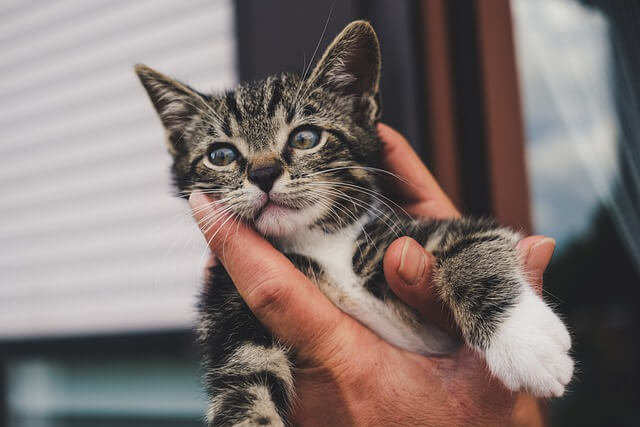Hookworms in Cats: Infection Process, Symptoms & Treatment
26.02.2022.
One of the most critical things cat owners need to do is - protect their cats from parasites. One of those parasites is the nasty hookworm. Your cat will need different things in its life. Still, it is up to us, their owners, to make sure they don’t have health problems because of various internal parasites they might get infected with. If you want to know more about hookworms and hookworm infections in cats, stick with us a little bit.
What are hookworms?
The first thing we need to know is - what are hookworms exactly? The shortest description of hookworms would be - intestinal parasites that can infect cats and dogs. They earned their name because they have hook-like mouthparts they use to attach themselves to the intestinal wall of the unsuspecting animal. These parasites are tiny, only about ⅛ of an inch long. Their diameter is so small you can barely see it with a naked eye.
There are different types of hookworms that can infect cats. The most common ones are Ancylostoma tubaeforme and Ancylostoma braziliense. Cats can get infected with Ancylostoma caninum, a type of hookworm that primarily infects dogs. However, those are extremely rare cases.
How can my cat get infected with hookworms?
To successfully prevent hookworm infections, we must first understand how hookworms infect cats. The most common type of infection happens when cats groom their paws. Here’s how that happens.

An adult hookworm will lay eggs in the intestines of an infected animal. Those eggs will get expelled with the animal’s feces. Hookworm eggs are resilient and can survive in the environment for weeks or even months. When an unsuspecting cat passes and steps on the hookworm egg, it will pick it up with its paw. Once the cat grooms itself, the egg will reach the cat’s intestines.
Once the egg reaches the intestines, it will hatch and become larvae. It will migrate to the cat’s intestinal wall, where it will attach itself and mature. Once it matures, it will produce eggs, and the circle continues. This process usually lasts 2 - 3 weeks.
How can I know if my cat has hookworms?
Most cat owners will have no idea their cats got infected with parasites. That is not surprising since hookworm eggs are invisible to the naked eye. However, most of us will notice when something weird starts happening with our cats. We will surely see changes in the cat’s health and sick appearance, which is when most of us will notify our vets and book an appointment. Still, knowing exactly what’s wrong with our cats can be challenging.
RELATED: Ringworms in Cats.
Symptoms of hookworm infection in cats
Most responsible cat owners will keep a close eye on their cats. Plus, we need to clean their litter boxes, and we can look at changes in their feces. While we might not suspect hookworm infections, we will surely notice the sick appearance a hookworm-infected cat has. Here are the most common symptoms of hookworm infections in cats;
- Black, tarry stool (indicates digested blood)
- Hair loss
- Poor coat quality
- Weight loss
- Anemia
- Skin irritations
- Itching

WORLD CAT FINDER TIP: Make sure you check your cat’s paws! Hookworms can infect cats through their skin. That mainly happens through the cat’s paws, which means paw health will be impacted.
How are hookworms diagnosed in cats?
When the owner takes a cat to the vet due to the symptoms they noticed, one of the first things your vet will ask you about is what other things you noticed about your cat. It would be pretty wise to write down all the symptoms you noticed; it will make your vet’s life easier. The vet will check all the clinical signs and ask you about the environment your cat lives in. That will help them decide which tests they can perform to find out what’s precisely bugging your cat.
The symptoms should point in the direction of intestinal parasites, and one of the tests they should ask for is fecal flotation. This test will analyze the cat’s feces and look for hookworm eggs. A tiny bit of your cat’s poo will be mixed in a special solution that will make the eggs float. They are then picked up and analyzed under a microscope. These eggs have a unique appearance, and hookworm infections are easy to diagnose.
How are hookworms treated?
The most important question cat owners have for their vets is - how is a hookworm infection in cats treated. Naturally, we all want to know how we can help our cats get rid of these nasty parasites. We will also want to know how fast will our cats recover.

The good news is that hookworm treatment is pretty effective and inexpensive. It is treated with antihelmintic medication. That is a cat deworming medication that is very effective against adult hookworms. However, it will not kill the hookworm larvae, which means the vet will administer two treatments, usually around 17 days apart. They need to wait until the larvae develop to administer the medication again and clear them all out. Cats treated with these medications will make a full recovery within a couple of weeks.
Can hookworms be prevented?
Hookworms and other parasites can be prevented. There are a few pieces of advice cat owners should follow to make sure their cats remain parasite-free and healthy. Here’s what all cat owners can do to prevent parasite infections;
- Use a monthly dewormer that protects cats against heartworms and hookworms.
- Make sure the cat’s environment is clean, especially from cat feces.
- Make sure there are no rodents in the cat’s environment.
- Clean the litter box on a daily basis.
- Kittens should be treated for parasites with vet-approved kitten dewormers (up to the cat breeder).
World Cat Finder Team







Share